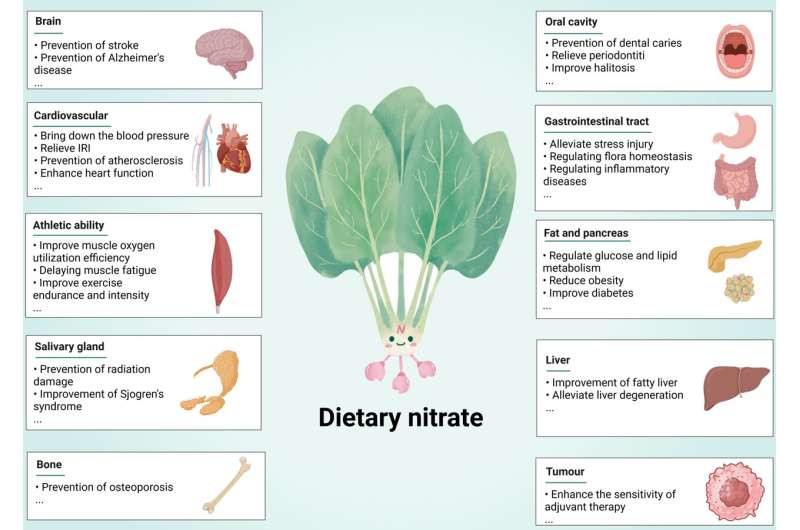This article has been reviewed according to Science X's editorial process and policies. Editors have highlighted the following attributes while ensuring the content's credibility:
fact-checked
trusted source
proofread
New research explores nitrate as an important messenger of body homeostasis maintenance

Homeostasis is a fundamental process through which the body maintains a dynamic equilibrium by regulating its internal environment using physiological mechanisms and feedback loops. It is essential for overall health and is the central focus of homeostatic medicine. The body possesses a reserve of physiological potential to adapt to changes in the external environment. Nitrate, as a dietary nutrient, plays a significant role in mobilizing the body's reserve potential to maintain homeostasis.
A new study appearing in in the journal Medicine Plus sheds light on this role.
Nitrate plays a crucial role in regulating the level of nitric oxide (NO) in the body through the nitrate-nitrite-NO pathway, which is vital for maintaining homeostasis. While the body can naturally produce NO through NOS, dysfunction of NOS can occur due to factors such as advanced aging, environmental changes (hypoxia), and disease development, leading to reduced NO synthesis and availability. To counteract this, supplementation of the nitrate-nitrite-NO pathway from external sources can help maintain NO homeostasis.
Moreover, sialin, a protein, serves as a transport channel for nitrate across mammalian cell membranes, establishing a positive feedback loop with nitrate. This feedback loop is essential for enhancing the efficiency of nitrate utilization.
Sialin is not only present in cell membranes but also in various intracellular structures like mitochondria and lysosomes. It plays a role in mediating several cellular functions, including improving mitochondrial function and intracellular autophagy. Therefore, investigating the nitrate-sialin loop-mediated cell biology and the regulation of NO homeostasis by nitrate are crucial areas for future research on nitrate-mediated homeostasis.
Currently, nitrate has been found to play a crucial role in maintaining homeostasis in various aspects of the body. It helps maintain the balance of microbiota, inflammatory immune response, and energy metabolism. Due to its diverse functions in homeostatic regulation, nitrate has a wide range of clinical applications.
One of its application scenarios is in oral diseases such as caries, periodontitis, and halitosis. Nitrate can also be used to treat digestive system diseases like stress gastric ulcer, colitis, and non-alcoholic fatty liver disease. Additionally, it is beneficial in cardiovascular system diseases including hypertension, heart failure, and atherosclerosis.
Nitrate can also improve exercise ability by delaying fatigue and enhancing exercise tolerance. It is also effective in managing glucose and lipid metabolism disorders like obesity and diabetes. Furthermore, it can be used to address iatrogenic injuries such as radiation injury and postoperative complications like ischemia-reperfusion injury. Moreover, nitrate has potential applications in tumor prevention and treatment as an adjuvant therapy sensitization.
These are just a few examples of the clinical applications of nitrate, highlighting its versatility and potential in various medical fields. However, the application of nitrate still faces challenges, particularly in maintaining optimal plasma concentration. To overcome this, researchers are focused on developing novel nitrate nanocomposite formulations that can sustain the release of nitrate and enhance its positive effects. This advancement holds promise for the future of utilizing nitrates in the prevention and treatment of chronic diseases, ultimately contributing to improved human health.
More information: Jian Zhou et al, Nitrate and body homeostasis, Medicine Plus (2024). DOI: 10.1016/j.medp.2023.100003




















